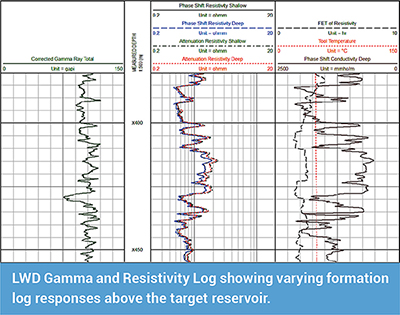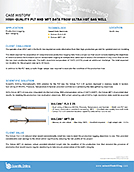Navigation
Real-time LWD Resistivity for Accurate Coring Point Selection
APPLICATION
/ Reservoir Evaluation
/ Log Correlation
/ Geostopping
TECHNOLOGY
/ Logging While Drilling (LWD)
/ Probe-based Resistivity Tool (PRT)
/ Measurement While Drilling (MWD)
/ Falcon MP MWD
LOCATION
/ Continental Europe
DOWNLOAD CASE HISTORY
/ PDF File
CUSTOMER CHALLENGE
After drilling a successful exploration well, an operator was looking to optimize the recovery factor in the field by drilling two additional development wells for further geological studies.
The operator’s goal for these two wells was to obtain rock cores from the hydrocarbon-bearing reservoirs. A proper coring point depth was a critical part of the reservoir evaluation program and required precise selection. This selection helped identify the key formation tops using LWD resistivity and gamma-ray logs. A confident correlation of real-time LWD data with offset wireline data would help determine when to stop drilling and pick up the coring bottom-hole assembly.
SCIENTIFIC SOLUTION
Scientific Drilling International (SDI) recommended pairing its Falcon MP high-speed MWD system with the Probe-based Resistivity Tool (PRT) to provide a suite of Gamma Ray and Resistivity logging. The logging will provide real-time transmission of the critical formation evaluation data.
The PRT’s LWD resistivity data would provide the operator’s geology team with reliable downhole measurements for log correlation purposes while drilling. The well’s 8.5″ production hole could utilize the LWD data across the entire section to determine the appropriate depth to stop drilling and switch the bottom-hole assembly to core the desired interval.
CUSTOMER VALUE
Equipped with accurate LWD logs in the development wells’ drilling and evaluation program, the operator made confident and accurate decisions while drilling. To avoid going past their desired borehole depth and maximize the coring interval in their target reservoir.
The cores obtained in the wells provided key insight into the possible compartmentalization of the reservoir due to extensive faulting in the structure.
YOU MAY ALSO BE INTERESTED IN
High-Quality PLT and MFT Data from Ultra Hot Gas Well 

